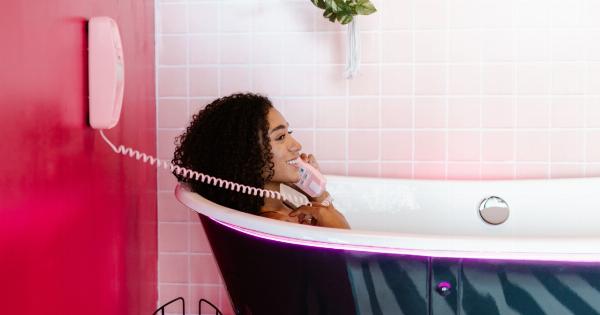It has become increasingly common for people to take their smartphones with them everywhere, including the bathroom.
Whether it’s to catch up on social media, play games, or watch videos, many individuals find it hard to detach themselves from their phones, even in such private moments. However, bringing your phone to the bathroom is a habit that is not only unhygienic but also detrimental to your well-being. In this article, we will explore the reasons why this habit is considered nasty and why it is crucial to break it.
1. Exposure to germs and bacteria
The bathroom is a breeding ground for germs and bacteria, and bringing your phone into this environment exposes it to these harmful microorganisms. Despite regular cleaning, bathrooms harbor an array of microbes, including fecal bacteria like E.
coli and salmonella. When you bring your phone in, you risk transferring these bacteria onto the device’s surfaces, which can then be easily transmitted to your hands and face when you touch or use the phone later on.
2. Increased risk of infections
By exposing your phone to the bacteria found in the bathroom, you also increase the risk of developing infections. When you touch your phone after using the bathroom, you may inadvertently introduce harmful bacteria to your hands.
If you touch your face, eyes, nose, or mouth without properly washing your hands, you provide an easy entry point for these bacteria to enter your body, potentially leading to various infections.
3. Cross-contamination
In addition to the risk of personal infection, bringing your phone into the bathroom can also lead to cross-contamination in shared spaces.
If you share your phone with others or place it on surfaces in your home or workplace, the bacteria from the bathroom can spread to these areas. This cross-contamination puts others at risk of coming into contact with harmful bacteria, especially if they touch your phone or the surfaces it has been in contact with.
4. Impact on personal hygiene practices
Bringing your phone to the bathroom can also have a negative impact on your personal hygiene practices.
When you have your phone in hand, you may be more prone to rushing through activities like handwashing, which is essential for preventing the spread of bacteria and viruses. Additionally, the distraction provided by your phone can make you less mindful of proper cleaning techniques, leading to inadequate hygiene practices.
5. Mental health implications
While it may seem harmless to use your phone in the bathroom, it can have negative implications for your mental health. Bathrooms have historically been a space for privacy and reflection, allowing individuals to decompress and recharge.
By constantly staying connected to your phone, you deny yourself this much-needed break and contribute to feelings of stress and anxiety.
6. Disturbed sleep patterns
Using your phone in the bathroom can disrupt your sleep patterns, especially if you tend to do so before going to bed. The blue light emitted by smartphones suppresses the production of melatonin, a hormone that regulates sleep.
By exposing yourself to this artificial light before bedtime, you may find it harder to fall asleep and experience poorer sleep quality overall.
7. Privacy concerns
Bringing your phone to the bathroom also raises privacy concerns. In this era of smart devices, it is crucial to be aware of potential security breaches.
When you use your phone in the bathroom, you may be more susceptible to accidental sharing of sensitive information or pictures due to distractions or malicious software. Keeping your phone out of the bathroom is a simple way to mitigate these risks.
8. Increased risk of accidents
Using your phone in the bathroom can also increase the risk of accidents. When your attention is divided between your phone and your surroundings, you may be more likely to slip, trip, or otherwise injure yourself.
Bathrooms already present hazards like wet floors and slippery surfaces, and adding a distracting device into the mix only compounds the risk.
9. Social disconnect
Bringing your phone to the bathroom can contribute to a social disconnect, even in the most intimate of spaces. It is important to establish boundaries and prioritize face-to-face interactions rather than constantly being glued to a device.
Keep the bathroom as a sanctuary where you can fully disconnect and focus on your personal well-being.
10. Breaking the habit
Breaking the habit of bringing your phone to the bathroom may seem challenging at first, especially if you have become accustomed to using it as a source of entertainment or distraction.
However, there are several strategies you can employ to help you overcome this habit:.
1. Establish phone-free zones: Designate certain areas, such as the bathroom, as phone-free zones, where you intentionally choose to leave your phone outside.
2. Stay present: Instead of turning to your phone for distraction, use your time in the bathroom as an opportunity for mindfulness or self-reflection.
3. Find alternative entertainment: Replace the habit of using your phone with other activities that do not involve electronic devices, such as reading a book or listening to music.
4. Keep your phone out of reach: Make it a habit to leave your phone in a different room or at a distance that requires you to physically get up and go get it if you feel the urge to take it with you.
5. Set boundaries: Establish boundaries with yourself and others by communicating the importance of disconnecting during private moments like using the bathroom.
Conclusion
The habit of bringing your phone to the bathroom is a nasty one that should be broken for various reasons.
From exposing yourself and others to harmful bacteria, increasing the risk of infections, and interfering with proper personal hygiene practices, to impacting your mental well-being, sleep patterns, and privacy, there are numerous disadvantages to this habit. By making a conscious effort to keep your phone out of the bathroom, you can protect your health, enhance your overall well-being, and reconnect with the importance of personal moments of solitude and reflection.































